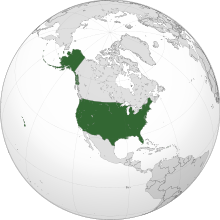Objectivism in the United States

| Objectivist movement |
|---|
 |
|
Theorists |
|
Objectivism, the philosophy of Ayn Rand, has a significant following in the United States, and the United States has a special status among nations in Objectivist thought and in the Objectivist movement. The U.S. is where Rand established Objectivism as a formal philosophy and where the Objectivist movement began. It is also home to the two most influential Objectivist institutions today—the Ayn Rand Institute (based in Irvine, California) and The Atlas Society (based in Washington, D.C.)—though many intellectuals affiliated with these institutions are not from the U.S. originally. Rand referred to the United States as "the greatest, the noblest and, in its original founding principles, the only moral country in the history of the world."[1]
Ayn Rand Institute
Leonard Peikoff, Rand's designated "intellectual heir", established the Ayn Rand Institute (ARI) in 1985. ARI is based in Irvine, California, and its executive director is Yaron Brook. ARI hosts an Objectivist Conference (OCON) annually in cities across the United States.[2]
In 2008, ARI established the Ayn Rand Center for Individual Rights in Washington, D.C. to focus on public policy issues.
Among the many intellectuals who have been affiliated with ARI are Harry Binswanger, Onkar Ghate, Elan Journo, Don Watkins, and Alex Epstein.
The Atlas Society
David Kelley founded The Atlas Society in 1990 in Washington, D.C. after a philosophical dispute with the Ayn Rand Institute. Kelley aimed to establish a more open-minded version of Objectivism in opposition to the culture at ARI, which he saw as close-minded. Unlike ARI, The Atlas Society participates in libertarian conferences.
The Undercurrent
The Undercurrent is a magazine disseminated on college campuses with content written from an Objectivist viewpoint. It is based in Walnut, California.
Influence in politics
Rand disliked politics independent of philosophy. She stated, "I do not join or endorse any political group or movement."[3] However, many have cited Rand as an influence in their political and economic views, particularly in the Republican Party and the Libertarian Party.
Republican Party
Senator Ted Cruz, Senator Ron Johnson, and Speaker of the House Paul Ryan are among the many Republican politicians who have directly cited Rand, particularly Atlas Shrugged, as an influence in their political and economic views.[4]
President-elect Donald Trump has cited Howard Roark, the hero in The Fountainhead, as a role model, though Objectivist intellectuals have repeatedly denounced many of his political positions.[5]
Libertarian Party and libertarianism
Objectivism has had a significant influence on the Libertarian Party and the libertarian movement. Although relations between Objectivists and libertarians have historically been hostile, many libertarians appreciate parts of Objectivism, especially its laissez-faire capitalist politics, as defended in Atlas Shrugged and Capitalism: The Unknown Ideal. Although the Ayn Rand Institute has a general policy to not associate with libertarians, The Atlas Society tends to take a friendlier approach to them and often participates in libertarian conferences.
Libertarian commentator Kennedy began her intellectual development into libertarianism after reading Introduction to Objectivist Epistemology.[6]
Ron Paul, who was the Libertarian presidential nominee in 1988, said that Rand was highly influential on him but that he did not agree with Objectivism.[7] His son, Rand Paul, has said that he has a great deal of respect for Rand and has read all her novels but maintains that he was not named after her.[8]
The 2012 and 2016 Libertarian presidential nominee Gary Johnson considers The Fountainhead his favorite book and has said that he loves Atlas Shrugged.[9]
Objectivist Party
Tom Stevens founded the Objectivist Party in 2008 on the principles of Objectivism.[10] Stevens was the Objectivist Party presidential nominee both in 2008 and 2012, with Alden Link as his running mate both times. Both Stevens and Link are former members of the Libertarian Party.
The Objectivist Party has no support from the Ayn Rand Institute or The Atlas Society, and Stevens' political career has been questioned on ethical grounds.[11]
See also
- Atheism in the United States
- Irreligion in the United States
- Objectivist movement
- Objectivism in Canada
References
- ↑ Ayn Rand. "Philosophy: Who Needs It". Fare.tunes.org. Retrieved 2016-11-12.
- ↑ "Objectivist Conference 2016 – LewRockwell". lewrockwell.com. Retrieved 2016-11-20.
- ↑ "“Libertarians” — Ayn Rand Lexicon". aynrandlexicon.com. Retrieved 2016-11-20.
- ↑ "The GOP's affinity for Ayn Rand won't go away | MSNBC". msnbc.com. Retrieved 2016-11-20.
- ↑ "Donald Trump's Role Model Is an Ayn Rand Character". nymag.com. Retrieved 2016-11-20.
- ↑ "MTV Libertarians: Kennedy, Kurt Loder Talk Politics & the Golden Age of MTV". YouTube. 2013-08-25. Retrieved 2016-11-12.
- ↑ "Ron Paul discusses Ayn Rand". YouTube. 2007-09-29. Retrieved 2016-11-12.
- ↑ "Rand Paul on Ayn Rand and his name". YouTube. 2009-05-19. Retrieved 2016-11-12.
- ↑ Remnick, David (2016-09-08). "What Is Aleppo, Gary Johnson?". The New Yorker. Retrieved 2016-11-12.
- ↑ "Rising Action : Thomas Robert Stevens, Objectivist Party Candidate For President, Files Statement Of Candidacy With Federal Election Commission". drtomstevens.blogspot.com. Retrieved 2016-11-20.
- ↑ "2008: The Five Faces of Political libertarianism". nolanchart.com. Retrieved 2016-11-20.